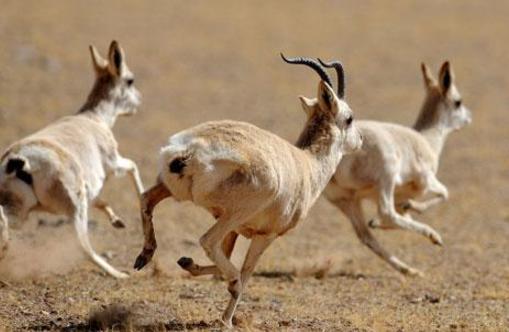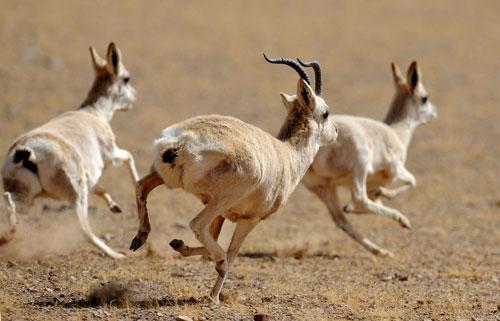Tibet, home to diverse wildlife

 0 Comment(s)
0 Comment(s) Print
Print E-mail CNTV, October 1, 2012
E-mail CNTV, October 1, 2012
Tibet, despite being known as the roof of the world due to its high altitude, is home to diverse wildlife. But as human activity in the area increases, the future of animals that roam the plateau is in doubt. Our reporter Liao Ruochen brings us a story from the Chiangtang National Nature Reserve where conservationists are making sure that doesn’t happen.
Chiang Tang lies in the western corner of the Tibetan Plateau. To the south and west, the Himalaya mountain range provides a natural barrier, separating China with the Indian Sub Continent.
And with deserts in the north, this has become one of the most remote and isolated places in the world.
This seemingly bleak plateau has become a safe haven for the animals that have adapted to this harsh land, where the air pressure is only about half of that at sea level.
|
|
|
Tibet, despite being known as the roof of the world due to its high altitude,is home to diverse wildlife. But as human activity in the area increases, the future of animals that roam the plateau is in doubt. |
Few visitors ever come to disturb the peace of this place.
Liao Ruochen, Chiang Tang, Tibet, said, "The natural reserve of Hoh Xil in Qinghai province has made a name for itself, but in fact, a large part of the natural reserve stretches all the way south into Tibet, this is the highest natural reserve in the world, and home to the largest group of endangered animals such as the Tibetan antelope."
Responsibility of protecting this land rests on the county of Ali. For a sparsely populated small town where the average annual income is less than 3,800 yuan or about 600 US dollars per year, this burden falls heavy on the local Forestry Bureau, who needs to watch over an area about half the size of Germany with only a small group of people.
Gama Zizhu, Vice Director of Forestry Bereau of Ali Couty, Tibet, said, The Chiang Tang nature reserve was established in 2001 to protect the wild animals living in the area. Over a total area of 156 thousand square kilometers, we have 16 kinds of mammals, including the Tibetan antelope, wild yaks and wild donkeys, and hundreds of birds. Before, the Tibetan antelope population was near extinction, and dropped below 10 thousand. After years of efforts, the number has grown to an estimated 70 thousand. The nature reserve currently have 130 conservationists, which means each of them have to patrol an area covering thousands of square kilometers.
And that is no small feat, given the shortage in funds and personnel. These conservationists played a critical role in the whole program, and although they are low on funds, the local government is working with wildlife protection organizations to make sure that they are adequately equipped in terms of knowledge.
Tsering Paldron, Wildlife Conservation Society, China, said, "These conservationist have all been recruited from local villages, they will be excellent examples to other people around them, so that more people will volunteer to help protect the animals and report poachers and other illegal huntings. Through them, we hope to build up overall awareness in local communities. Also, they are used to the environment in the wilderness, and know the area better than anyone else, they can gather informations that no others can, and make experienced observations such as seasonal changes. We are training them to record and locate each group of animals they see to help us in statistical research."
Zhao Huai Dong, Project Officer, Wildlife Conservation Society, China, said, "The most difficult thing now is that few people know of this place, people don’t even know there is a natural reserve up here, and that most Tibetan antelopes are not in Hoh Xil, not in Qinghai, but in Tibet."
And this is only the first step. This place is like no other, and sometimes the hardest thing to do to protect this land, is not to keep outsiders out, but keeping the peace between humans and animals that shared this place.






